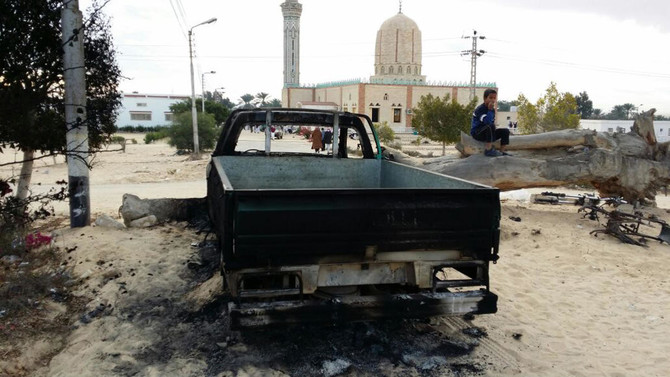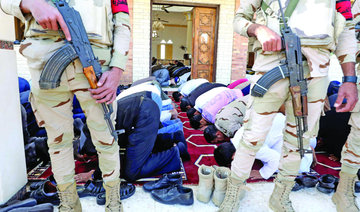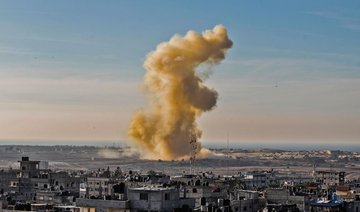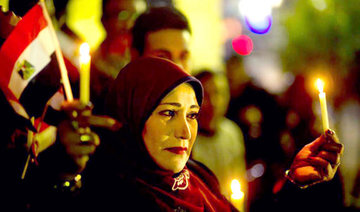CAIRO: The massacre of more than 300 worshippers at a mosque in Egypt’s Sinai crossed a new line — even by militants’ brutal standards — and could be a sign the Daesh group is trying to make up for the loss of its “caliphate” in Iraq and Syria or that an even more ultra-extremist faction is rising in power.
Either way, if the Daesh affiliate in Sinai does have a new readiness to slaughter Muslims, that threatens to put a further strain on Egypt’s security forces and intimidate anyone cooperating with the government in the fight against militants. But it also could raise a backlash against Daesh, prompting Sinai tribes to cooperate with the military and take greater action to stop any of their members from joining the group.
The Daesh -linked militants waging a campaign of violence in the Sinai and other parts of the country the past three years have traditionally targeted security forces, government officials, Christians and Muslim civilians suspected of collaborating with authorities. However, the November 24 attack — the bloodiest ever militant attack in Egypt — hit ordinary Muslims gathered for a Friday sermon, followers of the mystical movement in Islam known as Sufism that militants view as heretical.
“The ceiling of who is an infidel has risen to include worshippers and to view the slaying of Muslims inside mosques as permissible,” said Ahmed Ban, an Egyptian expert on Islamic extremist groups.
Ban suspects that followers of an ultra-extremist Daesh faction known as “Hazimiyoun” played a role or were behind the mosque attack.
It may also be possible that other Daesh militants carried it out, feeling pressure from the Hazimiyoun faction’s rising power to show they are not “soft.”
There has been no claim of responsibility for the Sinai attack, and it is impossible to confirm that the faction did have a role. Some experts believe that Daesh may have felt it needed a “showcase” attack to show it remains deadly even after losing almost all its territory in Syria and Iraq.
Tore Hamming, a researcher at the European University Institute focusing on jihadis and ideological differences within Daesh, said the mosque butchery was not necessarily connected to the Hazimiyoun faction. No Daesh fighters “would consider Sufis true Muslims.” He believed the attack came from a “great need (among IS) for large symbolic attacks.”
Even before the attack, Egyptian newspapers reported the emergence of the Hazimiyoun faction in Egypt. One quoted a prosecution official saying detained Egyptian Daesh suspects told their interrogators that they are followers of the Hazimiyoun and consider some Daesh leaders as infidels.
The faction is named after a radical cleric, Ahmad bin Omar Al-Hazimi, who has been imprisoned in his home country of Saudi Arabia since 2015. It considers as infidels — and therefore as legitimate to kill — all Muslims who do not accept the Daesh group’s interpretation of Islam. Even further, it says those who don’t consider such people as infidels are also infidels deserving of death. Al-Hazimi himself is not known as an Daesh member but his ideology has gained support within Daesh ranks.
The Daesh group is notorious for atrocities in Iraq, Syria and elsewhere, including against fellow Muslims; the group argues that killings of Muslims are justified when they were fighting Daesh or cooperating with its enemies or belong to branches of Islam it rejects, like Shiism. In Yemen, four Daesh suicide bombers struck two mosques filled with worshippers, killing over 130 people in one day in March 2015.
But Daesh largely argued that Muslims in general, even if they haven’t sworn allegiance to Daesh, are not necessarily legitimate targets, on grounds of “ignorance” — namely, that they may not have the religious knowledge to accept Daesh. The Hazimiyoun faction rejects the “ignorance” excuse.
The feud within Daesh has been stoked by the group’s military defeats in Iraq and Syria. Hazimiyoun clerics have blamed Daesh leader Abu Bakr Al-Baghdadi and his “lenient” ideology for the setbacks.
But the tensions date back to 2015, when Daesh in Syria executed a number of pro-Hazimiyoun clerics because of their excesses in declaring others infidels.
The more radical free hand has been criticized by Al-Qaeda-linked groups and other extremists in Egypt. Another militant group fighting the government in Sinai, called Jund Al-Islam, said in a recent audio message that it had ambushed an Daesh patrol to avenge attacks on other Muslims.
Whether due to growing Hazimiyoun influence or not, the first major militant attack on a Muslim congregation in Egypt underscored that Daesh could dramatically expand its targets. That could strain Egypt’s security forces, already stretched thin across much of the country to protect government facilities, major thoroughfares and tourist hotels, as well as banks, churches and museums.
The militants have targeted individual Sufis in the past. Extremists consider some Sufi practices to be a form of idolatry and heresy, but millions of Egyptians follow Sufism, and it is considered part of mainstream Islam. The targeted mosque was the headquarters of a local Sufi order, but non-Sufis were also among the 305 killed last week, including workers from a nearby salt factory.
“Any segment of society now is game for them,” said Mohammed Gomaa, an expert on extremist groups from the Al-Ahram Center for Political and Strategic Studies.
He said the mosque attack was “certainly the work of one of Daesh factions. They are sending a message of how far they’re willing to go, frighten tribes into submission and provide a response to a series of battlefield successes by security forces.”
But the attack could instead anger the tribes. Most of the victims were from Sinai’s powerful Sawarkah tribe, from which many of the Daesh affiliate’s fighters are believed to hail. The government hopes that will prompt the tribes to isolate the militants. Some tribal leaders have called on the government to arm them to fight Daesh, but security agencies have been reluctant.
After the attack, President Abdel Fattah El-Sisi ordered the military and security forces to crush the insurgency within three months, telling them to use “brute force.”
Fawaz Gerges, an expert on extremist groups who lectures at the London School of Economics, believes the scale and brazenness of the mosque attack could portend more brutal and indiscriminate attacks by the militants — and prompt a similar escalation by security forces, which responded to past major militant attacks by, according to local rights activists, collective punishment or carpet bombing.
He said it appeared the Daesh affiliate or rogue elements within it have decided to “wage all-out war, not just against the Egyptian state, but the Egyptian people as well.”
“It’s a doomsday scenario, and I believe there is no turning back now,” Gerges added. “The Egyptian state will win at the end, but the question is at what cost and how long will it be before it does.”
Egypt massacre in Sinai may point to an even more bloody Daesh
Egypt massacre in Sinai may point to an even more bloody Daesh

Nine of Gazan doctor’s 10 children killed in Israeli air strike

- Dr. Alaa Al-Najjar also saw her husband, Dr. Hamdi Al-Najjar, critically injured
- Couple’s only surviving child, 11-year-old boy, was severely wounded
LONDON: A pediatrician working in southern Gaza has lost nine of her 10 children in an Israeli air strike that hit her family home, in what fellow medics have described as an “unimaginable” tragedy.
Dr. Alaa Al-Najjar, who was on duty at the Nasser Medical Complex in Khan Younis at the time of the strike, also saw her husband, Dr. Hamdi Al-Najjar, critically injured.
The couple’s only surviving child, an 11-year-old boy, was severely wounded and underwent emergency surgery on Friday, according to reports.
“This is the reality our medical staff in Gaza endure. Words fall short in describing the pain,” said Dr. Muneer Alboursh, director general of Gaza’s Hamas-run health ministry. “In Gaza, it is not only healthcare workers who are targeted, Israel’s aggression goes further, wiping out entire families.”
Graphic footage shared by Palestinian Civil Defense, and verified by media outlets including the BBC, showed the remains of small children being pulled from the rubble of a collapsed building near a petrol station in Khan Younis.
British surgeon Dr. Graeme Groom, who is volunteering at Nasser hospital, said Dr Al-Najjar’s surviving son was his final patient of the day.
“He was very badly injured and seemed much younger as we lifted him onto the operating table,” he said in a video posted to social media.
Groom added that the child’s father, also a physician at the same hospital, had “no political and no military connections and doesn’t seem to be prominent on social media,” calling the strike “a particularly sad day.”
He continued: “It is unimaginable for that poor woman, both of them are doctors here… and yet his poor wife is the only uninjured one, who has the prospect of losing her husband.”
Relative Youssef Al-Najjar, speaking to AFP, made an emotional plea: “Enough. Have mercy on us. We plead to all countries, the international community, the people, Hamas, and all factions to have mercy on us. We are exhausted from the displacement and the hunger.”
Dr. Victoria Rose, another British doctor at the hospital, said the family had lived near a petrol station and speculated that the strike may have caused or been worsened by a large explosion. “That is life in Gaza. That is the way it goes in Gaza,” she said.
The Israel Defence Forces did not comment directly on the strike, but in a general statement said it had hit more than 100 targets across Gaza in a 24-hour period.
The Hamas-run health ministry reported at least 74 Palestinian deaths in that time frame alone.
The UN has warned that Gaza may be entering its “cruelest phase” of the war, with Secretary-General Antonio Guterres denouncing Israel’s restrictions on aid as exacerbating a humanitarian catastrophe.
Although Israel partially lifted its blockade this week, allowing limited aid to enter, the UN says the deliveries fall far short of the 500–600 trucks of supplies needed daily to meet basic needs for the territory’s 2.1 million people.
Since Israel launched its offensive after Hamas militants stormed into Israel, killing around 1,200 people and abducting 251 others, on Oct. 7, 2023, more than 53,000 Palestinians have been killed, according to Gaza’s health ministry, which includes women and children in its total but does not differentiate between civilians and combatants.
-ENDS-
Erdogan, Syria’s Sharaa hold talks in Istanbul

- Video footage on Turkish television showed Erdogan shaking hands with Sharaa
- The two countries’ foreign ministers also attended the talks
ISTANBUL: Turkish President Tayyip Erdogan was holding talks with Syrian President Ahmed Al-Sharaa in Istanbul on Saturday, news channel CNN Turk and state media said, broadcasting video of the two leaders greeting each other.
The visit comes the day after US President Donald Trump’s administration issued orders that it said would effectively lift sanctions on Syria. Trump had pledged to unwind the measures to help the country rebuild after its devastating civil war.
Video footage on Turkish television showed Erdogan shaking hands with Sharaa as he emerged from his car at the Dolmabahce Palace on the shores of the Bosphorus Strait in Turkiye’s largest city.
The two countries’ foreign ministers also attended the talks, as well as Turkiye’s defense minister and the head of the Turkish MIT intelligence agency, according to Turkiye’s state-owned Anadolu news agency.
The Syrian delegation also included Defense Minister Murhaf Abu Qasra, according to Syrian state news agency SANA.
MIT chief Ibrahim Kalin and Sharaa this week held talks in Syria on the Syrian Kurdish YPG militant group laying down its weapons and integrating into Syrian security forces, a Turkish security source said previously.
US strike on Yemen kills Al-Qaeda members: Yemeni security sources

- “Five Al-Qaeda members were eliminated,” said a security source in Abyan
- Washington once regarded the group as the militant network’s most dangerous branch
DUBAI: Five Al-Qaeda members have been killed in a strike blamed on the United States in southern Yemen, two Yemeni security sources told AFP on Saturday.
“Residents of the area informed us of the US strike... five Al-Qaeda members were eliminated,” said a security source in Abyan province, which borders the seat of Yemen’s internationally-recognized government in Aden.
“The US strike on Friday evening north of Khabar Al-Maraqsha killed five,” said a second source, referring to a mountainous area known to be used by Al-Qaeda.
The second security source added that, though the names of those killed in the strike were not known, it was believed one of Al-Qaeda’s local leaders was among the dead.
Washington once regarded the group, known as Al-Qaeda in the Arabian Peninsula (AQAP), as the militant network’s most dangerous branch.
Born in 2009 from the merger of Al-Qaeda’s Yemeni and Saudi factions, AQAP grew and developed in the chaos of Yemen’s war, which since 2015 has pitted the Iran-backed Houthi militants against a Saudi-led coalition backing the government.
Earlier this month, the United States agreed a ceasefire with the Houthis, who have controlled large swathes of Yemen for more than a decade, ending weeks of intense American strikes on militant-held areas of the country.
The Houthis began firing at shipping in the Red Sea and Gulf of Aden in November 2023, weeks after the start of the Israel-Hamas war, prompting military strikes by the US and Britain beginning in January 2024.
The conflict in Yemen has caused hundreds of thousands of deaths and triggered one of the world’s worst humanitarian crises, although fighting decreased significantly after a UN-negotiated six-month truce in 2022.
Iraq seeks deal to swap kidnapped academic for jailed Iranian

- Iraqi officials are working on a deal to release kidnapped Israeli academic Elizabeth Tsurkov in exchange for an Iranian jailed for murdering an American civilian
- Tsurkov was kidnapped in March 2023 allegedly by paramilitary group Kataib Hezbollah in Iraq
BAGHDAD: Baghdad is working on a deal to free kidnapped Israeli-Russian academic Elizabeth Tsurkov in exchange for an Iranian jailed in Iraq for murdering a US civilian, security sources said Saturday.
The deal depends on US approval, the senior Iraqi security officials told AFP, asking to remain anonymous because the matter is considered sensitive.
Tsurkov, a doctoral student at Princeton University, was kidnapped in Baghdad in March 2023.
There was no claim of responsibility for her abduction, but Israel accused Iraq’s powerful Kataeb Hezbollah of holding Tsurkov.
The Iran-backed armed faction has implied it was not involved.
Iraq has been working to solve the issue which “depends on the Americans’ approval for the release of the Iranian accused of killing an American citizen,” a senior security source said.
The three Iraqi sources said that Washington has not yet agreed to this.
“The Americans have not yet agreed to one of the conditions, which is the release of the Iranian who is being held for killing an American citizen,” one official said.
Iraq is both a significant ally of Iran and a strategic partner of the United States, and has for years negotiated a delicate balancing act between the two foes.
The Iranian and another four Iraqis were sentenced to life in prison in Iraq for murdering American civilian Stephen Troell, who was shot dead in Baghdad in November 2022.
In December last year, the US Justice Department announced that a “complaint was unsealed... charging” Iranian Mohammad Reza Nouri, “an officer” in the Islamic Revolutionary Guard Corps (IRGC), with allegedly orchestrating the killing.
Tsurkov, who is likely to have entered Iraq on her Russian passport, traveled to the country as part of her doctoral studies.
Security and diplomatic sources have told AFP they do not rule out the possibility that she may have been taken to Iran.
In November 2023, Iraqi channel Al Rabiaa TV aired the first hostage video of Tsurkov since her abduction.
AFP was unable to independently verify the footage or to determine whether she spoke freely in it or under coercion.
British Airways cancels Israel flights until August

- UK carrier suspended route to Tel Aviv after Houthi attack on Ben Gurion Airport in May
- Air France flights remain suspended but Delta, Aegean flights recommenced this week
LONDON: There will be no British Airways flights from the UK to Israel until at least August, the airline has said.
BA cited security concerns for the decision, having suspended flights to Tel Aviv in May following a Houthi missile attack that injured six people at Ben Gurion International Airport. The airline subsequently evacuated staff staying in the city to the Austrian capital Vienna.
A BA spokesman said in a statement: “We continually monitor operating conditions and have made the decision to suspend our flights to and from Tel Aviv, up to and including 31 July. We’ve apologised to our customers for the inconvenience.”
A message on the airline’s website for the route reads: “Sorry, we have no flights available. Please edit your search to find other routes.” The next scheduled flight from London to Tel Aviv is on Aug. 1.
Air France has halted flights in and out of Israel until at least May 26. Greek airline Aegean resumed flights to Tel Aviv on Wednesday, while US carrier Delta commenced daily flights from New York’s John F. Kennedy International Airport to Ben Gurion on Monday. Both had suspended their routes following the Houthi attack.






















